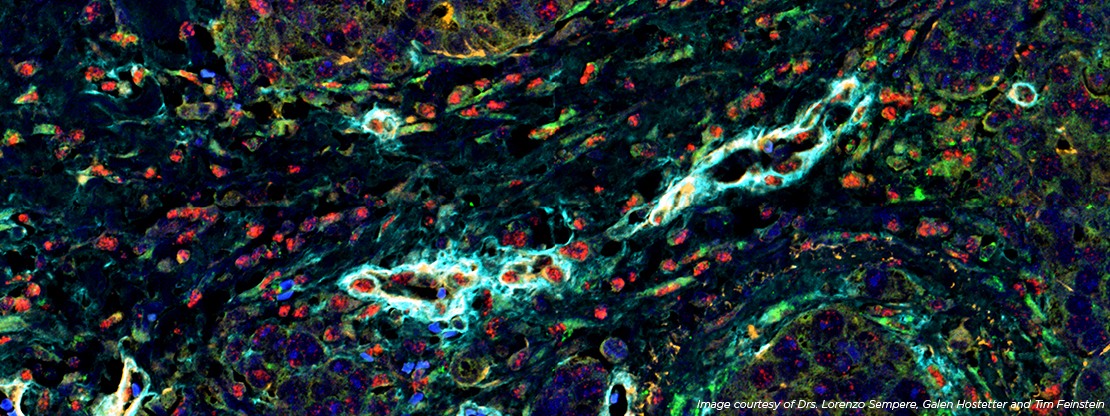In their own words: The most exciting advances in cancer research
February 3, 2017

In honor of World Cancer Day on Saturday, we asked our scientists and collaborators a simple question—what do you think is the most exciting thing happening right now in cancer research? Here’s what they said.
Dr. Peter Jones
Chief Scientific Officer, Van Andel Research Institute
Co-leader, VARI–SU2C Epigenetics Dream Team
Certainly immunotherapies, which work by harnessing the body’s own defenses, and epigenetic therapies, which correct errors in the way the genetic code is read and acted upon, are absolute game-changers. Both are at the forefront of cancer research and treatment individually, but we also now know that melding these approaches in the form of combination therapies may be the one-two punch needed to combat many difficult-to-treat cancers. It’s my hope that someday soon, the words “you have cancer” will lose their power thanks to more effective ways to diagnose and treat the disease. This is our mission and, together with our excellent collaborators, we are deeply committed to making it a reality.
Dr. Stephen Baylin
Co-leader, VARI–SU2C Epigenetics Dream Team
Director’s Scholar, Van Andel Research Institute
Co-head of Cancer Biology, Johns Hopkins University Sidney Kimmel Comprehensive Cancer Center
The potential for markedly improving the lives of patients with cancer has never been higher! In terms of our work in the Van Andel Research Institute–Stand Up To Cancer Epigenetics Dream Team, the possibilities for epigenetic therapy coming to the forefront as a cancer therapy are rapidly increasing. Nowhere is this more important than marrying epigenetic therapies with the exciting advances in immunotherapies. These latter treatments rank at the top of the list for promise to extend the quality and duration of survival for cancer patients and we have the chance to make this even better.
Our team is at the forefront of making these mergers with epigenetic therapy happen and it’s due to the main theme of our efforts— the increasing willingness of basic and clinical scientists, patient advocates and pharmaceutical companies to join with one another with the understanding that we can do more together than we could ever do alone. May the ultimate rewards, sooner rather than later, be what matter most— robustly improving the lives of our patients and even dramatically reducing the frequency of having to become a patient!
Huilin Li, Ph.D.
Professor, Center for Epigenetics
Director, Cryo-EM Core
I am most excited about the most recent advances in imaging tools—be it optical or electron in nature, such as the cryo-EM VARI just acquired—that are enabling biologists to see the inner workings of cells in unprecedented detail. Understanding how cells work helps scientists to understand how things go wrong and how diseases such as cancers develop. Using the advanced imaging tools, scientists are gaining new knowledge in certain areas that were intractable previously, and frequently at breathtaking speed. I am very optimistic about the outlook of cancer diagnosis and treatment.
Dr. Jeff MacKeigan
Associate Professor, Center for Cancer and Cell Biology
At the top of the list? Immunotherapy to treat cancer by blocking immune checkpoints to activate therapeutic antitumor immunity. This discovery was possible thanks to years of basic research on checkpoints (or inhibitory pathways) that regulate immune responses, and scientists connecting these findings to mechanisms of immune-checkpoint on tumor cells. The evidence of clinical activity and clinical responses has been transformative for treating cancer.
Scott Rothbart, Ph.D.
Assistant Professor, Center for Epigenetics
What most excites our group is the potential to translate basic mechanistic insights into chromatin regulation, which plays an important role in how the genetic code is packaged, into new epigenetic therapies to better treat cancer.
George Vande Woude, Ph.D.
Distinguished Scientific Fellow and Professor, Center for Cancer and Cell Biology
The most exciting thing right now is immunotherapy—it’s going to revolutionize cancer treatment. It addresses a fundamental problem, namely that when you treat cancer with a traditional drug, it can become resistant. Cancer is great at finding ways to avoid things that inhibit it. With immunotherapies, the treatment—the antibodies—are ours so they’re not foreign to the body. They target all of the cancer cells. These therapies aren’t years away. They’re helping patients now.
